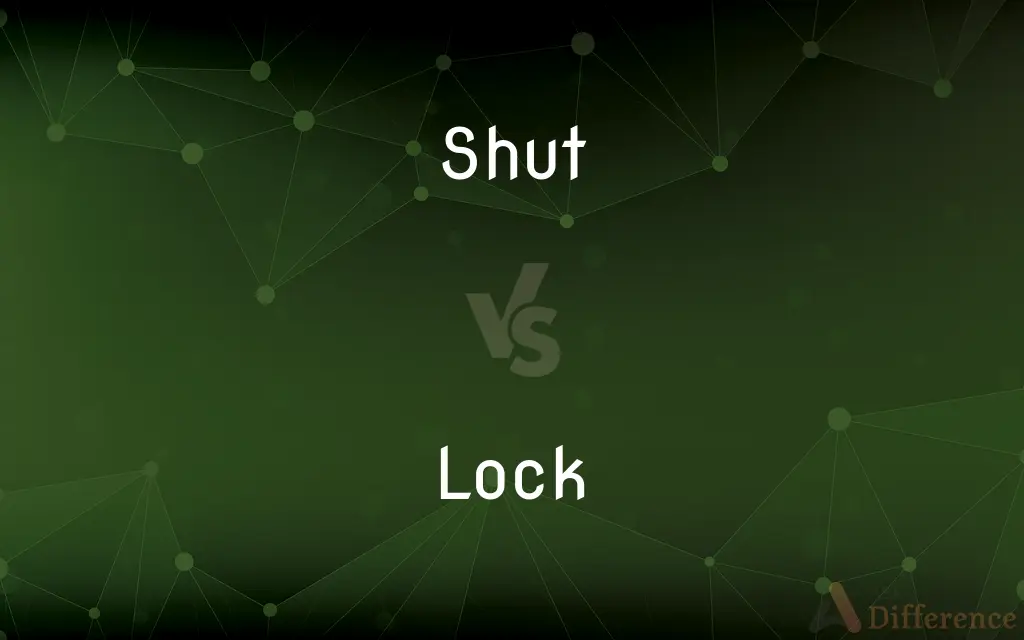Shut vs. Lock — What's the Difference?
Edited by Tayyaba Rehman — By Maham Liaqat — Updated on April 3, 2024
Shutting a door means to close it; locking a door involves securing it with a lock, which requires a key or combination to open.

Difference Between Shut and Lock
Table of Contents
ADVERTISEMENT
Key Differences
Shutting and locking are actions related to doors and containers, but serve different purposes. Shutting a door simply involves closing it to block or allow access, emphasizing physical movement. On the other hand, locking a door enhances security by restricting access to those who possess the correct key or combination.
Shutting is a basic operation that doesn't require special tools or devices; it's about changing an object's position to close an opening. Whereas locking requires a lock and key or a combination mechanism, introducing an element of security or privacy.
While shutting is universally applicable to various objects like doors, windows, and boxes, locking specifically involves an object designed to be secured with a lock. This distinction highlights the broader applicability of shutting versus the specialized intent of locking.
In the context of safety and privacy, shutting a door may provide a visual barrier, but locking it offers tangible security, ensuring only authorized individuals can gain access. This demonstrates the functional superiority of locking over simply shutting when security is a concern.
The action of shutting is instantaneous and reversible by simply pushing or pulling the object. In contrast, locking and unlocking require deliberate actions with the correct key or code, reflecting a higher commitment to securing an item or space.
ADVERTISEMENT
Comparison Chart
Purpose
To close an opening
To secure an opening
Requirement
No tools required
Requires a lock and key/combination
Applicability
Doors, windows, boxes, etc.
Objects designed to be secured
Security Level
Offers a visual barrier
Provides tangible security
Action Reversibility
Instantaneous and reversible
Requires correct key/code to reverse
Compare with Definitions
Shut
To close something, usually a door or window.
She shut the window to keep the cold out.
Lock
To secure something with a lock.
She locked the door before leaving.
Shut
To cease operations or activity.
The shop shuts at 9 pm.
Lock
To fix or secure firmly in position.
He locked the wheels of the bike.
Shut
To confine or enclose.
They shut the dog in the backyard.
Lock
To secure something against access or theft.
They locked the documents in the safe.
Shut
To stop someone from speaking or interrupting.
He was shut down during the debate.
Lock
To become fixed or unable to move.
The mechanism locks if you turn it this way.
Shut
To fold or bring together parts of something.
He shut his book and left the room.
Lock
To engage or become engaged securely.
The two pieces lock together easily.
Shut
To move (a door or lid, for example) so as to block passage through an opening.
Lock
A device operated by a key, combination, or keycard and used, as on a door, for holding, closing, or securing.
Shut
To fasten with a lock, catch, or latch
Shut the cabinet.
Lock
A section of a waterway, such as a canal, closed off with gates, in which vessels in transit are raised or lowered by raising or lowering the water level of that section.
Shut
To block entrance to or exit from; close
Shut a corridor.
Lock
A mechanism in a firearm for exploding the charge.
Shut
To confine in a closed space
Shut them in a cage.
Lock
An interlocking or entanglement of elements or parts.
Shut
To exclude from a closed space
Shut the cats out of the house.
Lock
(Sports) A hold in wrestling or self-defense that is secured on a part of an opponent's body.
Shut
To fold up or bring together the parts of
Shut the book.
Lock
A secure hold; control
The distributor has a lock on most of the market.
Shut
To cause to stop operating
Shut down a restaurant.
A school that was shut for the vacation.
Lock
A sure thing; a certainty
His promotion is a lock.
Shut
To move or become moved so as to block passage; close
A door that shuts by itself.
Lock
A length or curl of hair; a tress.
Shut
To stop operating, especially automatically
The electricity shuts off at midnight.
Lock
Often locks The hair of the head.
Shut
The act or time of shutting.
Lock
A small wisp or tuft, as of wool or cotton.
Shut
The line of connection between welded pieces of metal.
Lock
To fasten the lock of
Close and lock a drawer.
Shut
(transitive) To close, to stop from being open.
Please shut the door.
The light was so bright I had to shut my eyes.
Lock
To shut or make secure with or as if with locks
Locked the house.
Shut
(intransitive) To close, to stop being open.
If you wait too long, the automatic door will shut.
Lock
To confine or exclude by or as if by means of a lock
Locked the dog in for the night.
Locked the criminal up in a cell.
Shut
To close a business temporarily, or (of a business) to be closed.
The pharmacy is shut on Sunday.
Lock
To fix in place so that movement or escape is impossible; hold fast
The ship was locked in the ice through the winter. She felt that she had become locked into a binding agreement.
Shut
(transitive) To confine in an enclosed area.
I shut the cat in the kitchen before going out.
Lock
To sight and follow (a moving target) automatically
Locked the enemy fighter in the gun sights.
Shut
(transitive) To catch or snag in the act of shutting something.
He's just gone and shut his finger in the door!
Lock
To aim (a weapon or other device) at a moving target so as to follow it automatically
"The pilot had locked his targeting radar on the slow-moving frigate" (Ed Magnuson).
Shut
To preclude; to exclude; to bar out.
Lock
To clasp or link firmly; intertwine or interlock
Locked arms and walked away.
Shut
Closed; not open.
A shut door barred our way into the house.
Lock
To bind in close struggle or battle
The two dogs were locked in combat.
Shut
Synonym of close
Lock
To equip (a waterway) with locks.
Shut
The act or time of shutting; close.
The shut of a door
Lock
To pass (a vessel) through a lock.
Shut
A door or cover; a shutter.
Lock
To invest (funds) in such a way that they cannot easily be converted into cash.
Shut
The line or place where two pieces of metal are welded together.
Lock
To arrange or secure (an interest rate) for a loan.
Shut
A narrow alley or passage acting as a short cut through the buildings between two streets.
Lock
To end the processing of (a magnetic tape or disk) in such a way as to deny access to its contents.
Shut
To close so as to hinder ingress or egress; as, to shut a door or a gate; to shut one's eyes or mouth.
Lock
To protect (a file) from changes or deletion.
Shut
To forbid entrance into; to prohibit; to bar; as, to shut the ports of a country by a blockade.
Shall that be shut to man which to the beastIs open?
Lock
To become fastened by or as if by means of a lock
The door locks automatically when shut.
Shut
To preclude; to exclude; to bar out.
Lock
To become entangled or jammed; interlock.
Shut
To fold together; to close over, as the fingers; to close by bringing the parts together; as, to shut the hand; to shut a book.
Before faith came, we were kept under the law, shut up unto the faith which should afterwards be revealed.
When the scene of life is shut up, the slave will be above his master if he has acted better.
Lock
To become rigid or immobile
The mechanism tends to lock in cold weather.
Shut
To close itself; to become closed; as, the door shuts; it shuts hard.
Lock
To pass through a lock or locks in a waterway.
Shut
Closed or fastened; as, a shut door.
Lock
Something used for fastening, which can only be opened with a key or combination.
Shut
Rid; clear; free; as, to get shut of a person.
Lock
A mutex or other token restricting access to a resource.
Shut
Formed by complete closure of the mouth passage, and with the nose passage remaining closed; stopped, as are the mute consonants, p, t, k, b, d, and hard g.
Lock
A segment of a canal or other waterway enclosed by gates, used for raising and lowering boats between levels.
Shut
The act or time of shutting; close; as, the shut of a door.
Just then returned at shut of evening flowers.
Lock
(gun mechanisms) The firing mechanism.
Shut
A door or cover; a shutter.
Lock
Complete control over a situation.
Shut
The line or place where two pieces of metal are united by welding.
Lock
Something sure to be a success.
Shut
Move so that an opening or passage is obstructed; make shut;
Close the door
Shut the window
Lock
(rugby) A player in the scrum behind the front row, usually the tallest members of the team.
Shut
Become closed;
The windows closed with a loud bang
Lock
A fastening together or interlacing; a closing of one thing upon another; a state of being fixed or immovable.
Shut
Prevent from entering; shut out;
The trees were shutting out all sunlight
This policy excludes people who have a criminal record from entering the country
Lock
A place impossible to get out of, as by a lock.
Shut
Not open;
The door slammed shut
Lock
A device for keeping a wheel from turning.
Shut
Used especially of mouth or eyes;
He sat quietly with closed eyes
His eyes were shut against the sunlight
Lock
A grapple in wrestling.
Lock
A tuft or length of hair, wool, etc.
Lock
A small quantity of straw etc.
Lock
A quantity of meal, the perquisite of a mill-servant.
Lock
(intransitive) To become fastened in place.
If you put the brakes on too hard, the wheels will lock.
Lock
(transitive) To fasten with a lock.
Remember to lock the door when you leave.
Lock
(intransitive) To be capable of becoming fastened in place.
This door locks with a key.
Lock
(transitive) To intertwine or dovetail.
With his hands locked behind his back
We locked arms and stepped out into the night.
Lock
To freeze one's body or a part thereof in place.
A pop and lock routine
Lock
To furnish (a canal) with locks.
Lock
To raise or lower (a boat) in a lock.
Lock
To seize (e.g. the sword arm of an antagonist) by turning one's left arm around it, to disarm them.
Lock
To modify (a thread) so that users cannot make new posts in it.
Lock
To prevent a page from being edited by other users.
Frequently-vandalized pages are generally locked to prevent further damage.
Lock
To play in the position of lock.
Lock
A tuft of hair; a flock or small quantity of wool, hay, or other like substance; a tress or ringlet of hair.
These gray locks, the pursuivants of death.
Lock
Anything that fastens; specifically, a fastening, as for a door, a lid, a trunk, a drawer, and the like, in which a bolt is moved by a key so as to hold or to release the thing fastened.
Lock
A fastening together or interlacing; a closing of one thing upon another; a state of being fixed or immovable.
Albemarle Street closed by a lock of carriages.
Lock
A place from which egress is prevented, as by a lock.
Lock
The barrier or works which confine the water of a stream or canal.
Lock
An inclosure in a canal with gates at each end, used in raising or lowering boats as they pass from one level to another; - called also lift lock.
Lock
That part or apparatus of a firearm by which the charge is exploded; as, a matchlock, flintlock, percussion lock, etc.
Lock
A device for keeping a wheel from turning.
Lock
A grapple in wrestling.
Lock
To fasten with a lock, or as with a lock; to make fast; to prevent free movement of; as, to lock a door, a carriage wheel, a river, etc.
Lock
To prevent ingress or access to, or exit from, by fastening the lock or locks of; - often with up; as, to lock or lock up, a house, jail, room, trunk. etc.
Lock
To fasten in or out, or to make secure by means of, or as with, locks; to confine, or to shut in or out - often with up; as, to lock one's self in a room; to lock up the prisoners; to lock up one's silver; to lock intruders out of the house; to lock money into a vault; to lock a child in one's arms; to lock a secret in one's breast.
Lock
To link together; to clasp closely; as, to lock arms.
Lock
To furnish with locks; also, to raise or lower (a boat) in a lock.
Lock
To seize, as the sword arm of an antagonist, by turning the left arm around it, to disarm him.
Lock
To become fast, as by means of a lock or by interlacing; as, the door locks close.
When it locked none might through it pass.
Lock
A fastener fitted to a door or drawer to keep it firmly closed
Lock
A strand or cluster of hair
Lock
A mechanism that detonates the charge of a gun
Lock
Enclosure consisting of a section of canal that can be closed to control the water level; used to raise or lower vessels that pass through it
Lock
A restraint incorporated into the ignition switch to prevent the use of a vehicle by persons who do not have the key
Lock
Any wrestling hold in which some part of the opponent's body is twisted or pressured
Lock
Fasten with a lock;
Lock the bike to the fence
Unlock the door
Lock
Keep engaged;
Engaged the gears
Lock
Become rigid or immoveable;
The therapist noticed that the patient's knees tended to lock in this exercise
Lock
Hold in a locking position;
He locked his hands around her neck
Lock
Become engaged or intermeshed with one another;
They were locked in embrace
Lock
Hold fast (in a certain state);
He was locked in a laughing fit
Lock
Place in a place where something cannot be removed or someone cannot escape;
The parents locked her daughter up for the weekend
She locked her jewels in the safe
Lock
Pass by means through a lock in a waterway
Lock
Build locks in order to facilitate the navigation of vessels
Common Curiosities
Can a door be locked without being shut?
A door must be shut before it can be effectively locked.
Is shutting a door enough for security?
Shutting a door provides a visual barrier but lacks the security that locking offers.
Do all locks require keys?
Not all locks require keys; some use combinations or electronic mechanisms.
Can shutting offer privacy?
Yes, shutting a door or window can offer privacy by obscuring visibility.
What does it mean to shut something?
To shut something means to close it, such as a door or window.
What are common objects that can be shut?
Doors, windows, and containers are common objects that can be shut.
Why is locking considered more secure than shutting?
Locking restricts access to those with the correct key or combination, making it more secure.
Are there objects that can only be locked and not shut?
Objects specifically designed with locking mechanisms, like safes, require locking for security and may not have a "shut" function in the traditional sense.
What is the purpose of locking something?
Locking something aims to secure it against unauthorized access.
What is the difference between shutting and locking a window?
Shutting a window closes it, while locking it secures it against being opened from outside.
What does "shut down" mean in different contexts?
"Shut down" can mean to cease operations, as in a business closing, or to stop functioning, as in a computer turning off.
Is it possible to lock oneself out by shutting something?
Locking oneself out typically involves locking, not just shutting, as the lock prevents reentry without a key.
Can you lock something without a physical lock?
Yes, digital locks or security systems secure objects or information without a physical lock.
How does one reverse the action of shutting?
The action of shutting is reversed simply by opening the object again.
How does one reverse the action of locking?
Reversing the action of locking requires the correct key or combination to unlock.
Share Your Discovery

Previous Comparison
Get vs. Come
Next Comparison
Maltose vs. GlucoseAuthor Spotlight
Written by
Maham LiaqatEdited by
Tayyaba RehmanTayyaba Rehman is a distinguished writer, currently serving as a primary contributor to askdifference.com. As a researcher in semantics and etymology, Tayyaba's passion for the complexity of languages and their distinctions has found a perfect home on the platform. Tayyaba delves into the intricacies of language, distinguishing between commonly confused words and phrases, thereby providing clarity for readers worldwide.
















































